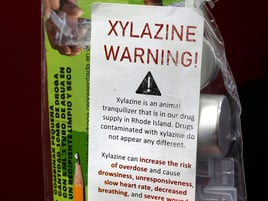In the face of the recent public health alert from the U.S. Drug Enforcement Administration (DEA), which we told you about last month, U.S. lawmakers are moving to classify the dangerous animal tranquilizer xylazine as a controlled substance.

The sedative, commonly known as “tranq” or “tranq dope,” is often paired with fentanyl to “pad” the product so that suppliers can increase profits.
Xylazine isn’t something users are seeking out, James Latronica, an addiction medicine doctor and the public policy chair of the Pennsylvania Society of Addiction Medicine, told The Guardian.
“You have an unregulated, unknowable supply that can be cut with whatever is at hand,” he said, adding that, from a supplier’s perspective, “it’s likely that it’s simply cheaper than fentanyl.”
‘Horrific’ Effects
Xylazine is used to tranquilize large animals such as horses but, for some unknown reason, in human users, it has a particularly gruesome side effect: necrosis, or rotting of human tissue.
The Guardian reports that, for someone using xylazine, “something as small as a pimple or a needle puncture could turn into large sores of dying flesh, in some cases eating through to the bone.”
Latronica says he’s had to perform multiple amputations as a result of the drug.
CBS News reports that other documented effects of xylazine include blurred vision, disorientation, drowsiness, coma, respiratory depression, and others.
Although it’s a sedative like fentanyl, xylazine isn’t an opioid, so the opioid antidote Narcan—now available over the counter—doesn’t work on victims.
Congress Acts
“Drug traffickers are going to great lengths to pad their profits with dangerous drugs like tranq, and we need to empower law enforcement to crack down on its spread in our communities,” Sen. Catherine Cortez Masto (D-NV), the lead sponsor of the bill, said in a statement.
“This bipartisan legislation will ensure the DEA and local law enforcement have the tools they need to get xylazine off our streets while protecting its important use as a veterinary tranquilizer,” she added.
The proposed legislation would make xylazine a Schedule III drug under the Controlled Substances Act.
The important thing for parents to do is to keep talking with their kids about the dangers of illicit drugs.
Aymet Demara, a licensed associate substance abuse therapist (LASAC) and the associate clinical director at Scottsdale Recovery Center suggest parents start by doing more listening than talking, she told Parade Magazine.
“Always ask questions,” she advises.
